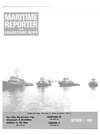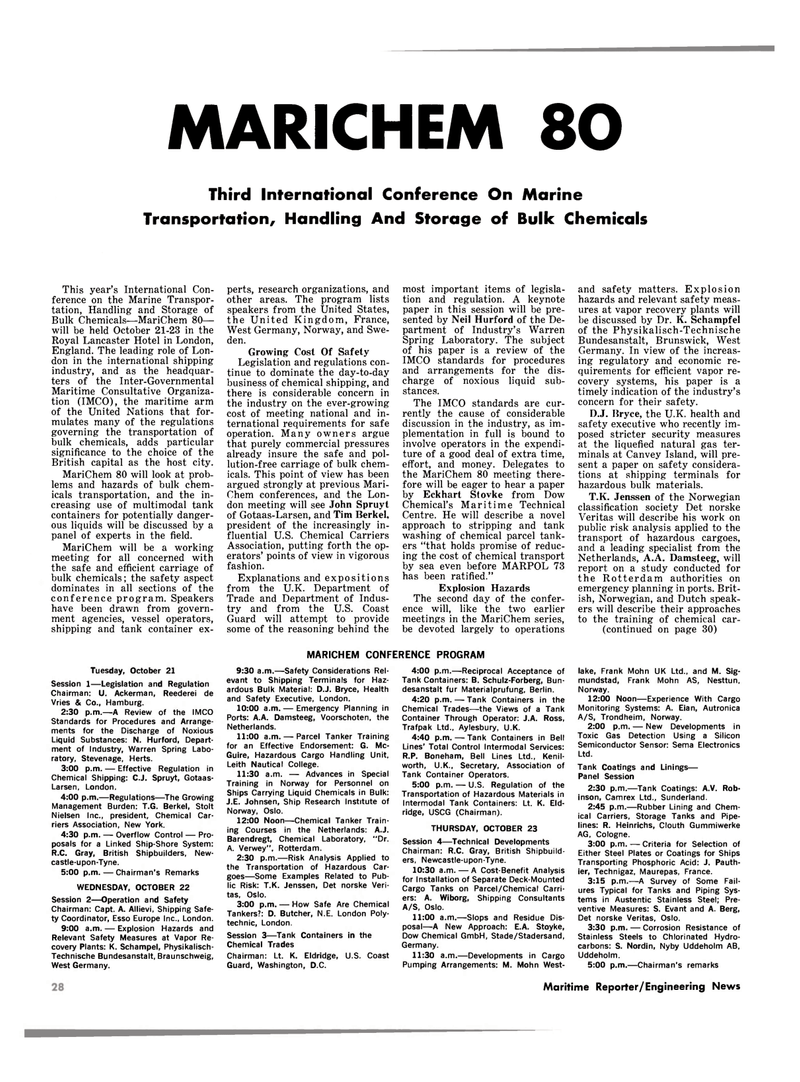
Page 24: of Maritime Reporter Magazine (October 1980)
Read this page in Pdf, Flash or Html5 edition of October 1980 Maritime Reporter Magazine
MARICHEM 80
Third International Conference On Marine
Transportation, Handling And Storage of Bulk Chemicals
This year's International Con- ference on the Marine Transpor- tation, Handling and Storage of
Bulk Chemicals—MariChem 80— will be held October 21-23 in the
Royal Lancaster Hotel in London,
England. The leading role of Lon- don in the international shipping industry, and as the headquar- ters of the Inter-Governmental
Maritime Consultative Organiza- tion (IMCO), the maritime arm of the United Nations that for- mulates many of the regulations governing the transportation of bulk chemicals, adds particular significance to the choice of the
British capital as the host city.
MariChem 80 will look at prob- lems and hazards of bulk chem- icals transportation, and the in- creasing use of multimodal tank containers for potentially danger- ous liquids will be discussed by a panel of experts in the field.
MariChem will be a working meeting for all concerned with the safe and efficient carriage of bulk chemicals; the safety aspect dominates in all sections of the conference program. Speakers have been drawn from govern- ment agencies, vessel operators, shipping and tank container ex- perts, research organizations, and other areas. The program lists speakers from the United States, the United Kingdom, France,
West Germany, Norway, and Swe- den.
Growing Cost Of Safety
Legislation and regulations con- tinue to dominate the day-to-day business of chemical shipping, and there is considerable concern in the industry on the ever-growing cost of meeting national and in- ternational requirements for safe operation. Many owners argue that purely commercial pressures already insure the safe and pol- lution-free carriage of bulk chem- icals. This point of view has been argued strongly at previous Mari-
Chem conferences, and the Lon- don meeting will see John Spruyt of Gotaas-Larsen, and Tim Berkel, president of the increasingly in- fluential U.S. Chemical Carriers
Association, putting forth the op- erators' points of view in vigorous fashion.
Explanations and expositions from the U.K. Department of
Trade and Department of Indus- try and from the U.S. Coast
Guard will attempt to provide some of the reasoning behind the most important items of legisla- tion and regulation. A keynote paper in this session will be pre- sented by Neil Hurford of the De- partment of Industry's Warren
Spring Laboratory. The subject of his paper is a review of the
IMCO standards for procedures and arrangements for the dis- charge of noxious liquid sub- stances.
The IMCO standards are cur- rently the cause of considerable discussion in the industry, as im- plementation in full is bound to involve operators in the expendi- ture of a good deal of extra time, effort, and money. Delegates to the MariChem 80 meeting there- fore will be eager to hear a paper by Eckhart Slovke from Dow
Chemical's Maritime Technical
Centre. He will describe a novel approach to stripping and tank washing of chemical parcel tank- ers "that holds promise of reduc- ing the cost of chemical transport by sea even before MARPOL 73 has been ratified."
Explosion Hazards
The second day of the confer- ence will, like the two earlier meetings in the MariChem series, be devoted largely to operations and safety matters. Explosion hazards and relevant safety meas- ures at vapor recovery plants will be discussed by Dr. K. Schampfel of the Physikalisch-Technische
Bundesanstalt, Brunswick, West
Germany. In view of the increas- ing regulatory and economic re- quirements for efficient vapor re- covery systems, his paper is a timely indication of the industry's concern for their safety.
D.J. Bryce, the U.K. health and safety executive who recently im- posed stricter security measures at the liquefied natural gas ter- minals at Canvey Island, will pre- sent a paper on safety considera- tions at shipping terminals for hazardous bulk materials.
T.K. Jenssen of the Norwegian classification society Det norske
Veritas will describe his work on public risk analysis applied to the transport of hazardous cargoes, and a leading specialist from the
Netherlands, A.A. Damsteeg, will report on a study conducted for the Rotterdam authorities on emergency planning in ports. Brit- ish, Norwegian, and Dutch speak- ers will describe their approaches to the training of chemical car- (continued on page 30)
MARICHEM CONFERENCE PROGRAM
Tuesday, October 21
Session 1—Legislation and Regulation
Chairman: U. Ackerman, Reederei de
Vries & Co., Hamburg. 2:30 p.m.—A Review of the IMCO
Standards for Procedures and Arrange- ments for the Discharge of Noxious
Liquid Substances: N. Hurford, Depart- ment of Industry, Warren Spring Labo- ratory, Stevenage, Herts. 3:00 p.m. — Effective Regulation in
Chemical Shipping: C.J. Spruyt, Gotaas-
Larsen, London. 4:00 p.m.—Regulations—The Growing
Management Burden: T.G. Berkel, Stolt
Nielsen Inc., president, Chemical Car- riers Association, New York. 4:30 p.m. — Overflow Control — Pro- posals for a Linked Ship-Shore System:
R.C. Gray, British Shipbuilders, New- castle-upon-Tyne. 5:00 p.m.—Chairman's Remarks
WEDNESDAY, OCTOBER 22
Session 2—Operation and Safety
Chairman: Capt. A. Allievi, Shipping Safe- ty Coordinator, Esso Europe Inc., London. 9:00 a.m. — Explosion Hazards and
Relevant Safety Measures at Vapor Re- covery Plants: K. Schampel, Physikalisch-
Technische Bundesanstalt, Braunschweig,
West Germany. 9:30 a.m.—Safety Considerations Rel- evant to Shipping Terminals for Haz- ardous Bulk Material: D.J. Bryce, Health and Safety Executive, London. 10:00 a.m. — Emergency Planning in
Ports: A.A. Damsteeg, Voorschoten, the
Netherlands. 11:00 a.m. — Parcel Tanker Training for an Effective Endorsement: G. Mc-
Guire, Hazardous Cargo Handling Unit,
Leith Nautical College. 11:30 a.m. — Advances in Special
Training in Norway for Personnel on
Ships Carrying Liquid Chemicals in Bulk:
J.E. Johnsen, Ship Research Institute of
Norway, Oslo. 12:00 Noon—Chemical Tanker Train- ing Courses in the Netherlands: A.J.
Barendregt, Chemical Laboratory, "Dr.
A. Verwey", Rotterdam. 2:30 p.m.—Risk Analysis Applied to the Transportation of Hazardous Car- goes—Some Examples Related to Pub- lic Risk: T.K. Jenssen, Det norske Veri- tas, Oslo. 3:00 p.m. — How Safe Are Chemical
Tankers?: D. Butcher, N.E. London Poly- technic, London.
Session 3—Tank Containers in the
Chemical Trades
Chairman: Lt. K. Eldridge, U.S. Coast
Guard, Washington, D.C. 4:00 p.m.—Reciprocal Acceptance of
Tank Containers: B. Schulz-Forberg, Bun- desanstalt fur Materialprufung, Berlin. 4:20 p.m. — Tank Containers in the
Chemical Trades—the Views of a Tank
Container Through Operator: J.A. Ross,
Trafpak Ltd., Aylesbury, U.K. 4:40 p.m. — Tank Containers in Bell
Lines' Total Control Intermodal Services:
R.P. Boneham, Bell Lines Ltd., Kenil- worth, U.K., Secretary, Association of
Tank Container Operators. 5:00 p.m. — U.S. Regulation of the
Transportation of Hazardous Materials in
Intermodal Tank Containers: Lt. K. Eld- ridge, USCG (Chairman).
THURSDAY, OCTOBER 23
Session 4—Technical Developments
Chairman: R.C. Gray, British Shipbuild- ers, Newcastle-upon-Tyne. 10:30 a.m. — A Cost-Benefit Analysis for Installation of Separate Deck-Mounted
Cargo Tanks on Parcel/Chemical Carri- ers: A. Wiborg, Shipping Consultants
A/S, Oslo. 11:00 a.m.—Slops and Residue Dis- posal—A New Approach: E.A. Stoyke,
Dow Chemical GmbH, Stade/Stadersand,
Germany. 11:30 a.m.—Developments in Cargo
Pumping Arrangements: M. Mohn West- lake, Frank Mohn UK Ltd., and M. Sig- mundstad, Frank Mohn AS, Nesttun,
Norway. 12:00 Noon—Experience With Cargo
Monitoring Systems: A. Eian, Autronica
A/S, Trondheim, Norway. 2:00 p.m. — New Developments in
Toxic Gas Detection Using a Silicon
Semiconductor Sensor: Sema Electronics
Ltd.
Tank Coatings and Linings—
Panel Session 2:30 p.m.—Tank Coatings: A.V. Rob- inson, Camrex Ltd., Sunderland. 2:45 p.m.—Rubber Lining and Chem- ical Carriers, Storage Tanks and Pipe- lines: R. Heinrichs, Clouth Gummiwerke
AG, Cologne. 3:00 p.m. — Criteria for Selection of
Either Steel Plates or Coatings for Ships
Transporting Phosphoric Acid: J. Pauth- ier, Technigaz, Maurepas, France. 3:15 p.m.—A Survey of Some Fail- ures Typical for Tanks and Piping Sys- tems in Austentic Stainless Steel; Pre- ventive Measures: S. Evant and A. Berg,
Det norske Veritas, Oslo. 3:30 p.m. — Corrosion Resistance of
Stainless Steels to Chlorinated Hydro- carbons: S. Nordin, Nyby Uddeholm AB,
Uddeholm. 5:00 p.m.—Chairman's remarks
TO Maritime Reporter/Engineering News

 23
23

 25
25
